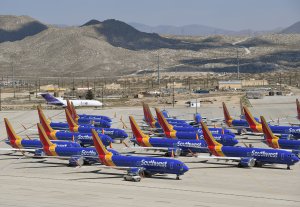Southwest Airlines reported a sharp drop in profit in the fourth quarter because of the continued grounding of the Boeing 737 Max. It said it will seek additional compensation from Boeing as the problem is expected to stretch deep into 2020.

The 737 Max was grounded in March following two fatal crashes that killed 346 people, and Boeing announced this week that it doesn’t expect approval for the plane to fly again until the middle of 2020.
Southwest owns 34 of the Max jets, more than any other airline, and it had expected to end the year with 75 of the jets by the end of the year before the grounding halted deliveries of new planes. Boeing and Southwest reached a confidential agreement on compensation late in the year.
“We will continue discussions with Boeing regarding further compensation,” said Southwest CEO Gary Kelly. Much of the compensation will come in the form of reduced pricing on future purchases from Boeing, the company said.
Southwest increased profit-sharing payments to employees by $97 million with money it got from Boeing.
Southwest said the Max grounding cut its income by $828 million during the course of 2019. That is a significant portion of a $5 billion after-tax charge that Boeing has already taken to cover the cost of compensating all of its customers. It is expected Boeing will have to take an additional huge charge as part of its fourth quarter results out next week.
Southwest reported its net income fell $140 million in the fourth quarter and $167 million in the year, mostly because of the loss of the Max jets.
The airline has been removing about 330 weekday flights from its schedule due to the grounding. It has canceled flights only through early June, but in light of Boeing’s new guidance on when the plane will be approved to fly, Southwest expects further cancellations throughout much if not all of the summer.
Southwest only flies Boeing 737 jets, both the Max and earlier versions of the plane. Despite that relationship, or maybe because of it, Kelly has been very critical of Boeing in recent months.
“It’s three months on and we’re still talking about the same thing. There’s nothing to be happy about. I feel like there’s been progress made, but not enough,” he told CNBC Thursday. “We need to get this thing done and get the Max back up in the air.”
He did give a vote of confidence to Boeing and its new CEO, David Calhoun, who started the job last week.
“I believe in him. I believe in Boeing,” he said. “They’ll get these things addressed. They’ve made a lot of mistakes. There are things they need to fix. But I think he’s the right man at the right time.”
American Airlines, the world’s largest airline and another Max customer, also reported results Thursday, but it was able to achieve a $54 million increase in profit in the quarter after excluding one-time items, and a $62 million earnings increase over the course of the year. American does not depend as heavily on the Max or earlier versions of the 737 as does Southwest. It had 24 of the jets at the time of the grounding.
There are also 13 additional Max jets built for American since the grounding waiting to be delivered, and American said it hopes to get those deliveries completed by the end of the year so it can retire older, less efficient aircraft. But that’s only half the additional Max planes that American had been expecting to get from Boeing by the end of 2020 before the grounding took place.
American did not break out the cost of the grounding in its earnings report Thursday, but in October it said it expected the grounding would reduce its full-year pre-tax income by $540 million.
American has also reached a agreement with Boeing to compensate it for the grounding.
“While we can’t disclose details of the agreement, American shareholders should know that the agreement reflects our priority to ensure our shareholders are adequately compensated with real value for the extended ground,” said American CEO Doug Parker to analysts on Thursday. He also said American will be seeking further compensation for the grounding extending into 2020.
Both Southwest and American were helped by industry trends including lower fuel costs in the quarter and strong demand for travel. But the grounding of the Max meant that the two of them as well as United Airlines were not able to benefit from that strong demand as much as Delta Air Lines and other smaller carriers that do not own any of the grounded jets.
“There has been a huge transfer of share from carriers that operate the Max to carriers that don’t operate the Max, and we saw that in the fourth quarter,” said Vasu Raja, American’s senior vice president of strategy, in comments to analysts.
Parker said that while the grounding of the Max continues to be an issue for American, it is one it is able to overcome.
“We’re not going to have our strategy dictated by when this airplane comes or doesn’t come. We know it will fly again someday,” he said. “When the FAA sign off that the aircraft is ready to fly, we’ll be ready … We’re looking forward to that. But until that time, we’ll keep doing exactly what we’re doing.”
Shares of Southwest were up 3% in afternoon trading Thursday, while American shares gained 2%. Airline stocks have been hammered this week out of concern that the coronavirus in China, which has killed 17 people there, could spread and affect people’s willingness to travel by air. But airline stocks overall gained Thursday after the an emergency committee of the World Health Organization declared that it is “too early to consider that this event is a public health emergency of international concern.”
Correction: An earlier version of this story mistakenly attributed a quote from American executive Vasu Raja to a different executive with the company.











